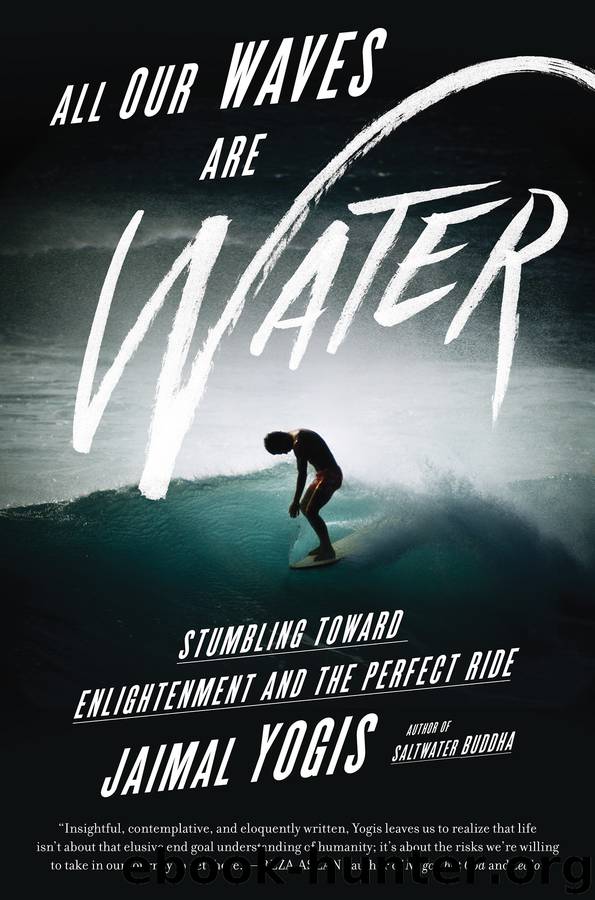All Our Waves Are Water by Jaimal Yogis

Author:Jaimal Yogis
Language: eng
Format: epub
Publisher: HarperCollins
Published: 2017-07-04T04:00:00+00:00
13
I loved Thurman’s class. It shook me up in just the way I needed shaking. After that one class, I started doing my daily zazen again. Surfing still involved a two-hour train ride and had to be very occasional, but I at least took a few more laps in the pool. I felt better.
As for the life-after-death ideas, I was tempted to say, as I usually did, “Yeah, maybe.”
There are lots of types of intelligence. And I’m not sure this means much, but my maternal grandfather, Larry Klar, had a genius IQ. He was even named best mathematician for his class at West Point. Gramp was also a happy man, a dear friend to all his grandchildren, and pushed us constantly to think for ourselves. Gramp said that he was staying agnostic about the soul and God until science could prove it. At one point Gramp even said he might try cryogenics so he could be revived in the future and see if scientists had made any progress on the big questions.
Gramp never did that. He died peacefully in his sleep two weeks after smashing me in a game of tennis. (Also, he did become rather spiritual in his final years.) But I’d decided to take Gramp’s approach of rational agnosticism too, which jibed with the Buddha’s suggestion to accept nothing blindly but to test out spiritual teachings like a scientist to see if they really did work to relieve suffering. At some point, if you meditate deeply, it’s said you will recall past lives naturally. I wasn’t there. So agnosticism allowed me to entertain all possibilities without taking anything on faith.
This had worked OK. But maybe because I hadn’t been all that great of a spiritual scientist, it also made me feel weak at times—swayed by whatever the dominant view of a culture was. In India, I leaned toward Sonam and his multiple-lives view. At the Ch’an monastery, I could see how perspective changed based on the mind—that belief was relative to other assumptions of culture and geography—and that in any case the body returned to the grass and the sea and the air.
But outside these sanctuaries, surrounded by a culture that seemed clear the afterlife was an opiate of the people, I’d found myself leaning toward that materialist view. This view assumed that consciousness arises from the brain. And when the brain dies, so does consciousness. Anything beyond that was magical thinking.
After Thurman’s class, however, it struck me that my agnosticism might be what was also making life in my twenties so unstable. Since turning eighteen, I’d wanted to be a lifeguard one day, a war reporter the next, a scientist one day, a monk the next, a harlot one day, married the next. Part of this was just indecision. But also, if I really looked, these desires fluctuated depending on whether I was running the “screw it, you only live once” view or the “mind and soul are infinite” view.
I was rarely consciously thinking of either of these.
Download
This site does not store any files on its server. We only index and link to content provided by other sites. Please contact the content providers to delete copyright contents if any and email us, we'll remove relevant links or contents immediately.
Imperfect by Sanjay Manjrekar(5878)
Wiseguy by Nicholas Pileggi(5784)
The Body: A Guide for Occupants by Bill Bryson(5096)
Tuesdays with Morrie by Mitch Albom(4784)
Unstoppable by Maria Sharapova(3524)
Not a Diet Book by James Smith(3426)
Crazy Is My Superpower by A.J. Mendez Brooks(3400)
Into Thin Air by Jon Krakauer(3399)
The Mamba Mentality by Kobe Bryant(3276)
The Fight by Norman Mailer(2940)
Finding Gobi by Dion Leonard(2842)
Tuesdays With Morrie by Mitch Albom(2762)
The Ogre by Doug Scott(2683)
My Turn by Johan Cruyff(2625)
Unstoppable: My Life So Far by Maria Sharapova(2502)
Accepted by Pat Patterson(2371)
Everest the Cruel Way by Joe Tasker(2342)
Borders by unknow(2313)
Open Book by Jessica Simpson(2267)
